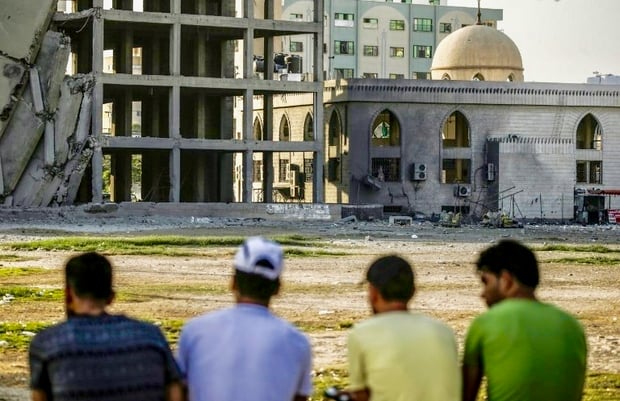
Palestinian youths look at a building and mosque that were damaged by an Israeli air strike in Gaza City. Israel’s military said it had launched air strikes targeting Hamas in the Gaza Strip on July 14 as rockets and mortars were lobbed into southern Israel from the blockaded Palestinian enclave. / AFP PHOTO / MAHMUD HAMS
In recent days, various Israeli media outlets have reported that a long-term truce between Israel and Hamas is imminent. According to a foreign source, such a truce was discussed between Israeli Prime Minister Benjamin Netanyahu and US National Security Advisor John Bolton. The question remains, what incidents have prompted the negotiation of this truce, what obstacles remain in the way, and what are the pros and cons of such a truce?
Recent months have witnessed intense violence between Israel and Palestinian terror groups in Gaza that included weekly riots, attacks on Israeli soldiers and attempts to infiltrate Israel. Incendiary kites launched from the coastal strip have set hundreds of fires in southern Israel, burning over 7,000 acres of land. Since the March of Return began, more than 610 rockets and mortar shells had been fired at Israel by August 9. During the same period of time, around 170 Palestinians have been killed and 18,000 Palestinians wounded.
According to Palestinian human rights activist Bassem Eid, “The Israeli side has a huge interest for a long term truce because that will give Israel more of an opportunity to focus on the northern border with Hezbollah, Syria and Iran.” Dr. Reuven Ehrlich, the head of the Meir Amit Intelligence and Terrorism Information Center, believes the truce will be based on the understandings that were reached following Operation Protective Edge: “This is the basis of everything. I think that first of all, all of the sides concerned must agree on a cease-fire. It seems like all of the relevant sides will agree on something minimalistic.”
Some Israelis support such a cease-fire. Former Israel Consul General Yitzchak Ben Gad declared: “I believe Hamas will not change its ideology. They do not believe Israel has a right to exist. Therefore, there is no chance for peace because people do not change their radical ideology overnight. The only way forward is to achieve a cease-fire, which is quiet for a while, one year, two years, whatever.”
However, not everyone in Israel is happy with the idea of Israel negotiating a truce with Hamas. As Israeli Druze diplomat Mendi Safadi notes, experience has shown that an arrangement with a terror organization that does not attempt to reach stability or security over the long-term “only prepares the terrorists for another round of terror for the residents of Israel.”
Prominent Middle East scholar Dr. Mordechai Kedar added: “In my view, any agreement without returning the Israeli dead soldiers and the citizens that are in Gaza is a major failure of the Israeli negotiator. Secondly, I would like to know what will happen if and when Israel finds a new tunnel dug into Israel. Is Israel allowed to blow it up within this agreement or not? In another related question, if Israel finds out one day that Hamas has built a factory to produce missiles which can precisely hit all of the cities from Metula to Eilat, does Israel have permission to get rid of this factory or not? This is very important point because if Israel does not close this issue now, it might be a problem in the future.”
Kedar and Safadi are not the only ones opposed to this cease-fire. According to Eid, “It looks like one of the biggest obstacles to such a truce between Hamas and Israel is the PA. The PA in their recent central committee announced that any truce has to be made by the PLO, which is considered as the only representative of the Palestinian people. It looks like Abbas right now is very upset with the Egyptian government. How can the Egyptian government coordinate such a truce between Hamas and Israel by excluding the PLO, the PA and Abbas? It is not going to be easy, for Abbas also announced that if the truce takes place between Hamas and Israel, he will cut any support or funding for the Gazan strip. That would be hell for the Gazan people.”
While it remains to be seen whether Israel and Hamas in Gaza will successfully negotiate a long-term cease-fire and whether the parties to the conflict remain committed to it, one thing is certain: Civilians on both sides will continue to suffer so long as quiet and tranquility are not restored both to the Gaza Strip and the communities of southern Israel.